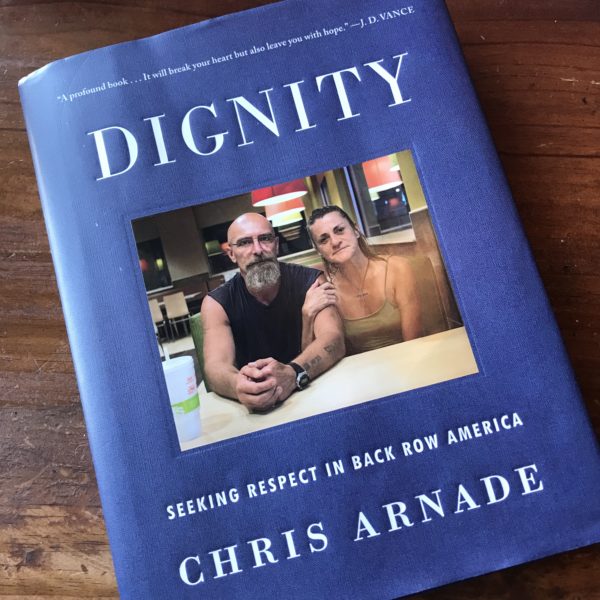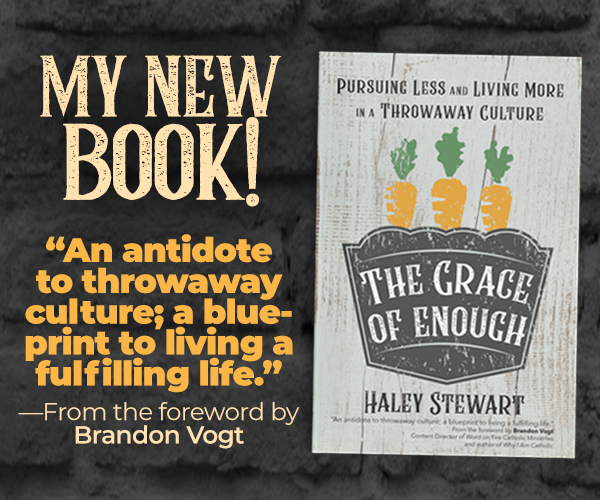Welcome to Carrots! I'm so glad you're here. This is where I share thoughts on liturgical living, faith, parenting, culture, and an extra dose of Jane Austen. You can sign up for my email newsletter here to stay in touch, or look me up on Instagram!

If I could suggest only two books about the current landscape of America right now they would be Just Mercy by Bryan Stevenson about our prison system and the recently released Dignity: Seeking Respect in Back Row America by Chris Arnade.
I first heard of Arnade from my husband, Daniel, who started following him on Twitter ages ago. “Have you heard of the guy who sits and talks to people who come into McDonald’s?” Daniel asked.
After growing dissatisfied with his job on Wall Street, Arnade started spending more and more time talking with people in crumbling communities. Where do “back row Americans,” as Arnade calls them, gather when community spaces of the past have disappeared? The nearest McDonald’s.
It’s a damning fact that a fast food chain is one of the few places people can gather to talk due to the demise of community spaces, but McDonald’s is where people are charging cell phones, getting a drink, sitting and reading the newspaper, seeking respite from heat and cold, and meeting friends. In his travels, Arnade would get to know the regulars in McDonald’s all over America.
And this is what makes Dignity so unusual. Arnade isn’t a politician. He didn’t go into this project with a plan in mind for reshaping America. Rather than trying to fit the people he interviews and photographs into a certain political narrative, Arnade listens.
From the Bronx to Selma, Alabama to Bakersfield, California and many places in between, crumbling communities and poverty may have slightly different causes but Arnade’s travels reveal that alarming symptoms of loneliness, despair, and addiction are plaguing Americans despite the great diversity of those he interviews. The picture he paints of those who have been left behind by the economy and the cultural elite is truly devastating. And if you needed more of a wake up call, his incredible photographs will cut you to the quick. All is not well and Dignity doesn’t let you forget it.
Arnade also emphasizes that the diagnosis is complicated. What becomes clear is that the voices Dignity highlights do not fit into the dichotomy of America political parties. Just because someone is a “back row” American, doesn’t mean he/she will agree with other back row Americans on how to fix things. The perspectives are various, but what everyone does seem to agree on is that the status quo has failed them. This is why the same communities vote for those who will “shake things up” whether that means Obama or Trump. The photographs Arnade includes and the experiences of the people he interviews reveal a nearly dystopian picture of individuals desperately trying to survive and to satisfy the desires of the human heart for belonging, joy, friendship, community, and dignity. For these communities, this project of seeking these basics of human thriving is like trying to assemble a mirror out of a thousand broken shards of glass.
“Do you like this town?” “Why do you stay in a crumbling community?” “Why did you start/stop doing drugs?” “What matters to you?” These are the sorts of questions Arnade asks and one must only imagine he has a keen ability to put people at their ease because the honesty of the responses is astonishing. What is revealed is that these dying places are filled with living people and their suffering and their choices that front row Americans find so easy to deride become completely understandable in light of the world they must navigate. It’s easy to preach personal responsibility as a front row American with cultural capital and educational credentials that unlock opportunity. It’s easy to judge other people’s choices when we are removed from the trauma that those growing up in poverty in communities with endemic drug addiction suffer.
Arnade is not pushing a specific antidote to the loneliness, despair, and humiliation of those in poverty. Instead, he gives a voice to those who are often merely examined as statistics by the “experts.” And the key takeaway for me is that not only does front row America judge those in the back row for their lack of education and lack of success, we often fail to comprehend a value system that prioritizes community identity and that seeks to remain near extended family even when lucrative jobs have vanished.
If leaving your sense of place behind is the price you must pay for success, perhaps that price is too high. Especially for those living in poverty for whom a family network is truly the only capital they have. If we say, “just move,” it could be that we have forgotten what it means to be from somewhere. And we are out of touch with the reality of what uprooting means to someone who is barely scraping by.
In short, not just the education and poverty of back row Americans is mocked, but what they most dearly value is dismissed as unimportant–including religion. As the elite walk away from faith, back row Americans are still very religious. In addition to his vigils at McDonalds, Arnade would attend a church service in the communities he visited and what he discovered (as an atheistic lapsed Catholic) surprised him. He describes himself as “a scientist trying to understand religion.” At first he acknowledged the usefulness of individuals being a part of a faith community: “Something popular because it worked.” After attending hundreds of churches he admits “I was beginning to realize there was more to it than that…perhaps religion was right, or at least as right as anything could be.” This kind of humility to learn from the people he encountered–whether about their faith or about their struggles–makes Dignity something truly extraordinary.
Chris Arnade never pretends to have all the answers, but he’s doing something that simply isn’t happening elsewhere: asking back row Americans not just the right questions, but any questions at all. Instead of treating them like numbers or problems, Arnade sees those in the crumbling communities he visits as human beings deserving of dignity. Through his eyes, we have the chance to see them that way, too, as children of God, made in His image.
The following link is an Amazon affiliate link.
Order Dignity: Seeking Respect in Back Row America by Chris Arnade from Amazon. For today only get $5 off with the code PRIMEBOOK19.

Going on the list to read!!!!
Thank you for the review.
Just checked this book out of the library. Looking forward to reading it.